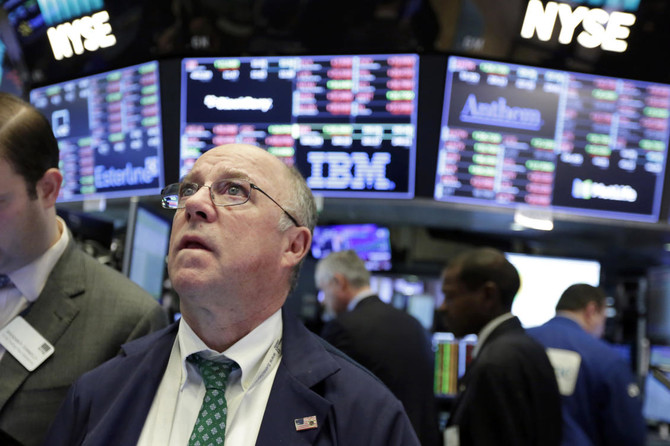NEW YORK: US stocks extended their declines in highly volatile trading on Tuesday following the biggest one-day drops for the S&P 500 and Dow in more than six years.
After an initial 2-percent drop, major Wall Street indexes recovered but that bounce-back failed to gain traction.
Following are comments from analysts and investors:
BRENT SCHUTTE, CHIEF INVESTMENT STRATEGIST AT NORTHWESTERN MUTUAL WEALTH MANAGEMENT
“In general, I want to be clear that we think that this is a correction, not the start of a recession. Recessions cause prolonged market downturns, corrections occur when people are positioned wrongly, with their repositioning causing a sharp but often short pullback.
“What I think has happened is that you had people positioned for an environment of lots of central bank easing, low inflation and interest rates and importantly low volatility. Now they are having to shift to an environment that looks like you’ll have less central bank easing, rising inflation, rising interest rates and rising volatility.
“In the short term, the economy and the markets can diverge like they have over the past few days, but in the intermediate term they move in tandem and I continue to believe the global economy will push higher and eventually pull the markets with it.”
MICHAEL ANTONELLI, MANAGING DIRECTOR, INSTITUTIONAL SALES TRADING AT ROBERT W. BAIRD IN MILWAUKEE
“What we saw yesterday was the death of the short volatility trade. For the longest time, people had been shorting volatility. That trade started to crack on Friday because the market started to sell off. Yesterday the trade died because the market imploded.
“The short-volatility trade needed to be covered as volatility rose. As the VIX rallied it caused every algorithm to start selling stocks.
“If this is just the implosion of shorting volatility, it’s not the end of the bull market. People will be afraid now of shorting volatility. It’ll change the complexion of the market. It takes away what many considered to be easy money.”
WILLIE DELWICHE, INVESTMENT STRATEGIST AT ROBERT W. BAIRD IN MILWAUKEE
“It’s a lot of people trying to figure out what in the world is going on. How much of yesterday was program sells that got out of hand, how much of it was the VIX-related stuff and how much of it was maybe more meaningful. At this point it is still a sorting out kind of process.
“The choppiness this morning is trying to figure out where we should be. Some of what we saw yesterday suggests we are near at least a short-term low. Then the question is what the rallies look like after that. Given how fast we’ve come down, the expectation would be that we would be in for some violent rallies on the way up, but they would need to persist to gain some confidence that we’ve really worked through this. I don’t see evidence of that just yet.
“It probably takes a little bit of churning, a little bit of testing some of the lows we have seen and then at that point seeing what the quality of the rally is. But between now and then, history would say to expect more volatility and that would include rallies that look absolutely amazing on a short-term basis.”
CHAD MORGANLANDER, PORTFOLIO MANAGER AT WASHINGTON CROSSING ADVISORS IN FLORHAM PARK, NEW JERSEY
“Put your seatbelts on. It’s going to be a volatile ride for the next several trading sessions.
“Fundamentals are moving forward in a positive way, which gives us confidence that in the long run you’ll continue to see higher highs within the markets. But investors have to become a little bit more aware that long-term returns going forward are going to be lower than in the past several years within the S&P 500 and the overall equity markets.
“Overall, I think for long-term investors, it’s a drastic mistake to overreact to volatility that sometimes is a healthy dose of medicine.”
GENE TANNUZZO, SENIOR PORTFOLIO MANAGER, COLUMBIA THREADNEEDLE, MINNEAPOLIS, MINNESOTA
“There’s been a pretty swift rebound across a lot of measures. Certainly interest rates are clawing back quite a bit. If I look at the performance of credit, it has been clawing back a bit. With regards to high-yield and investment grade, we’ve noticed that liquid derivatives are moving with higher velocity than the cash market.
“Bonds certainly opened this morning quoted lower and it seems like people are trying to put money to work. The amount by which bid offers widened is quickly evaporating. And so, are prices that different from Thursday or Friday of last week? Actually they are not.
“It’s pretty amazing that the volatility we saw in stock prices hasn’t translated into fundamental weakness in the bonds space.”





















